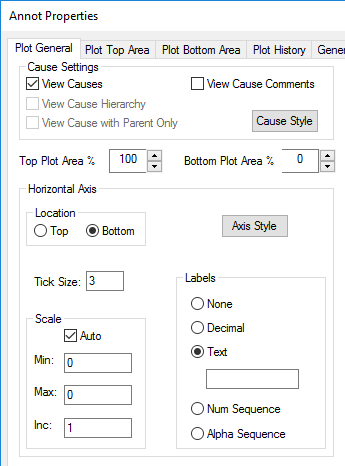
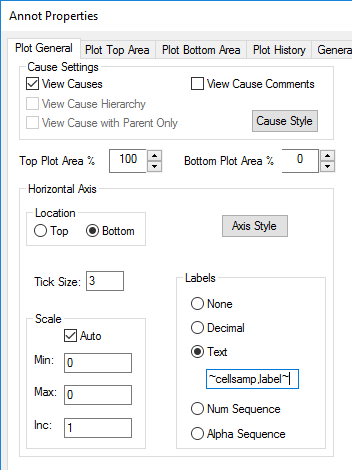
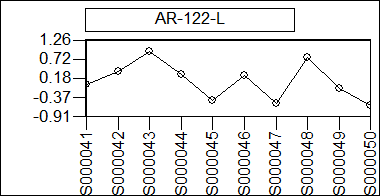
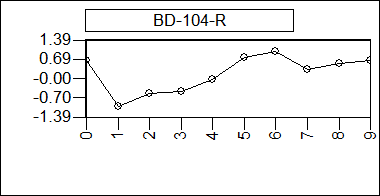
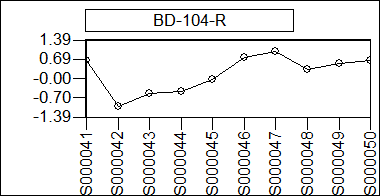
~act~
Value of actual for the characteristic specified in the query.
~act,[char]~
Returns the actual value for the specified characteristic. For example ~act,pos~ returns the actual value for the Position characteristics.
~act,cause~
Returns the label of the assigned cause, if a cause has been assigned.
~act,cause,comment~
Returns the comment of the assigned cause, if a cause has been assigned. See also ~cause,comment~.
~act,cause,desc~
Returns the label and the description of the assigned cause, if a cause has been
assigned.
~act,status~
Can return one of the following strings:
Active - Loaded from database, displayed and used in statistical calculations.
Masked - Loaded from database and displayed, but not used in statistical calculations.
Missing - No data exists.
Hidden - Data exists, but is not loaded from database.
Archived - Not loaded from database and will be archived.
~acttype~
Returns the type of the actual data.
~acttype,[char]~
Type of results data for the specified characteristic (Actual or Deviation).
~actvalue~
Returns the value of the actual data.
~actvalue,[char]~
Raw value of results data for the specified characteristic.
~cellsamp~
Returns the label for the sample resolved for the cell. For DataSets with multiple Routines, this resolves as the row number.
~cellsamp,label~
Returns the label for the sample resolved for the cell. For DataSets with multiple Routines, this variable will resolve the text of a chart axis as the Sample Label instead of the DataSet column number. This is best used with either a single feature or with Routines that have corresponding samples.
| Chart Properties - Axis Text | Chart Properties - Axis Text + Variable | ||||
 |
 |
||||
| Single Routine | Multiple Routines | Multiple Routines with Variable | |||
 |
 |
 |
|||
~cellsamp,filter,[a-z]~
Returns the specified filter for the sample resolved for the cell. For DataSets with multiple Routines will resolve the text of a chart axis as the Sample Label instead of the DataSet column number. This is best used with either a single feature or with Routines that have corresponding samples.
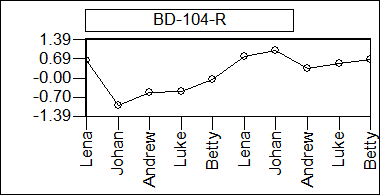
~dev~
Returns the deviation value based on the query setting.
~dev,[char]~
Returns the deviation value of the specified characteristic, based on the query setting.
~devtype~
Returns the deviation type, Vec or Car, based on the query setting.
~sampdatecount~
Returns the amount of unique dates in a row.
~sampdateordered~
If the samples are ordered by date, this variable returns the value 'Yes'. If the samples are not ordered by date, this variable returns the value 'No'.
~samp~
Returns the label of the current sample. This is the same as ~samp,label~. When a Sample [Parameter] is appended to any sample variables, the DataSet results will be overridden and the sample signified by the sample paramter will be returned.
~samp,archdate~
Returns the archive date of the sample.
~samp,archdays~
Returns the number of days after the creation date until the samples are archived.
~samp,archtype~
Returns the archive type of the sample: Date, Days, or Never.
~samp,date~
Returns the creation dates of the samples in a DataSet.
~samp,date,%__~
Returns the creation dates of the Sample in a format specified by the specified Date parameter(s).
For example, if the date was March 14, 2002, ~samp,date,% d-%b-%Y~ would resolve to "14-MAR-2002". If the time were 08:12:59, ~samp,date,% M past % H~ would resolve to "12 past 08". See here for a complete list of parameters.
~samp,desc~
Returns the description of the sample.
~samp,effdate~
Returns the effective date of the current sample.
~samp,filter,[filterlabel]~
Returns the value assigned to the sample filter associated with the sample. This variable replaced the obsolete variable, ~sample,filter,info~.
~samp,impdate~
Returns the import date of the sample.
~samp,index~
Returns the position of the sample as it exists in the Query.
~sample,label~
Returns the sample label. This is the same as ~samp~ and is the default sample parameter.
~samp,order~
Returns the number of the Sample’s position based on the order of Samples in the Query.
~samp,seq~
Returns the sequence number of the sample.
~samp,status~
Returns the status of the sample:
o Active - Loaded from database, displayed and used in statistical calculations.
o Masked - Loaded from database and displayed, but not used in statistical calculations.
o Missing - No data exists.
o Hidden - Data exists, but is not loaded from database.
o Archived - Not loaded from database and will be archived.
~samp,subgroup~
Returns the subgroup label.
~samp,subgroupseq~
Returns the sequence order within the subgroup.
~samp,type~
Returns the sample type: Var, HVD, or Mix.
~sample~
Returns the label of the current sample. This is the same as ~samp~.
~sample,serial~
Returns the serial number of the sample.
~samples~
Number of samples in a DataSet.